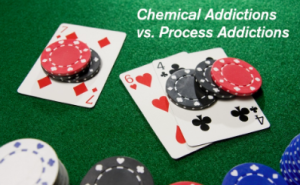By Lorraine Saldivar, LCDC-I

First, it is important to understand that all addictions, chemical or process, affect the neuro-chemical reward and gratification system of the brain. The reasons a person initially starts using substances or begins a process may differ, but because the pleasure sensors in the brain receive a surge of dopamine, serotonin, oxytocin, and epinephrine, the brain perceives it as pleasurable and initially satisfying. This is the reason people keep coming back. When they come back again and again and again, the person can become addicted to the surge. Addiction happens when the brain goes from wanting these chemicals in order to “feel good” to needing them…and eventually will need more of them. This is what is known as tolerance and can happen in chemical and process addictions, with some variances. For example, when a person is addicted to crack cocaine, the person eventually needs more crack in order to feel the same level of high. However, with a porn addiction, for example the person does not need more porn, but rather different types of porn in order to satisfy the craving.
Something we see that is common in both chemical and process addictions is that consumers continue to use their drug of choice, or practice the rituals of their process addiction despite negative physical, relational, emotional, and sometimes legal consequences.
So why am I talking about this on a blog for a treatment center for drugs and alcohol? Well, it is not uncommon for us to find out a client that comes to us for treatment for a chemical addiction, also has, or has had a process addiction. Twelve Step support groups often warn people in recovery of the perils of cross addictions, and often people think only in terms of looking out for other chemicals. Because we know chemicals are often used as a maladaptive coping mechanism to deal with overwhelming feelings of anxiety, depressions, or to alleviate pain, people in recovery need to learn to identify addictive thought, behaviors and actions. For example, a person who turns to food for comfort may eat an entire pizza in order to cope with certain emotions. However, once the pizza is gone the person may then feel an overwhelming amount of shame and guilt and thus may turn to alcohol in order to “feel better” about over-eating.
A key component to helping people who may be suffering from one or both of these types of addiction is education. It is important to find out as much as you can and then to seek help either through treatment, support groups, counseling, prescribed medications (if warranted), or any combination of the these. Finally, it is important to know that the brain is a wonderfully powerful organ that can overcome any addiction and to know that there is ALWAYS hope!
